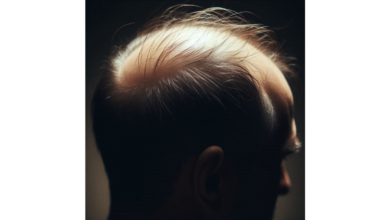The Ultimate Guide to Using Cloves and Rosemary for Hair Growth

As many are on the quest for thicker, healthier hair, the natural realm provides abundant solutions. Among the most promising herbs are cloves and rosemary. These ingredients have been celebrated for their potential benefits for hair growth, encouraging individuals to explore their traditional uses and impressive properties. With this ultimate guide to using cloves and rosemary for hair growth, let’s delve deeper into how these remarkable ingredients can revitalizing your hair care routine.
Benefits of Using Cloves for Hair Growth
Cloves, the aromatic spice derived from the buds of the Syzygium aromaticum tree, pack a punch beyond culinary uses. Their unique properties make them an excellent ally for hair health. Here’s how:
- Improved Blood Circulation: When you apply clove-infused oil or paste to your scalp, it stimulates blood circulation. This increased blood flow can enhance the delivery of nutrients to your hair follicles, encouraging growth.
- Rich in Antioxidants: Cloves are high in antioxidants, which combat oxidative stress. By protecting hair follicles from damage caused by free radicals, cloves can help maintain a healthy growth cycle.
- Antimicrobial Benefits: The powerful antimicrobial properties of clove oil keep the scalp clean, preventing infections and dandruff that can hinder hair growth. A clean scalp is essential for creating the right environment for healthy hair.
- Natural Conditioning: Cloves can also act as a natural hair conditioner. When added to your hair care regimen, they may help to soften and add shine to your strands.
For instance, a friend of mine incorporated clove oil into her routine, noticing a significant reduction in dandruff. She felt her hair was much healthier overall, allowing her to sport her natural curls with confidence.
Benefits of Using Rosemary for Hair Growth
Now, let’s turn our attention to rosemary. Often found in our kitchens, rosemary is not just a flavor enhancer but a botanical powerhouse for promoting hair growth. Here are some of its key benefits:
- Stimulates Hair Follicles: Rosemary oil has been shown to stimulate hair follicles, similar to the way minoxidil, a common hair loss treatment, works. This stimulation can promote new hair growth and bring vitality to thinning hair.
- Reduces Hair Loss: Research suggests that rosemary oil can help reduce hair shedding by inhibiting the conversion of testosterone to DHT (dihydrotestosterone), a hormone responsible for hair loss.
- Anti-inflammatory Properties: Inflammation can lead to many hair-related issues, including thinning and breakage. The anti-inflammatory properties of rosemary can help soothe the scalp, contributing to a healthier environment for hair growth.
- Enhances Scalp Health: Rosemary oil helps improve circulation and adds moisture to the scalp, reducing dryness and irritation that could affect hair growth.
You might recall an instance where a cousin swore by rosemary oil for her postpartum hair thinning. After consistently using rosemary-infused products, she noticed her hair becoming fuller and healthier within a few months. In summary, cloves and rosemary offer exceptional benefits that can transform your hair care routine. By enhancing circulation, reducing hair loss, and fostering a healthy scalp environment, these powerful natural ingredients are worth considering for anyone looking to invigorate their hair growth journey. Next, we’ll explore the fascinating properties of cloves and rosemary to deepen your understanding of why they’re beneficial for hair health.
Understanding the Properties of Cloves and Rosemary
Now that we’ve explored the benefits of cloves and rosemary in hair growth, it’s time to dive deeper into the scientific properties that make these natural ingredients so effective. Understanding their antioxidant, anti-inflammatory, antimicrobial, and antifungal characteristics will provide you with a solid foundation for incorporating them into your hair care routine.
Antioxidant and Anti-inflammatory Properties
Both cloves and rosemary are rich in antioxidants—a buzzword that frequently appears in health conversations. Antioxidants help fight oxidative stress caused by free radicals, molecules that can damage cells and lead to premature aging, including hair thinning. Here’s how these properties benefit your hair:
- Protection Against Damage: The antioxidants in cloves and rosemary protect hair follicles from environmental stresses, such as pollution and UV rays, ensuring your hair remains healthy and vibrant.
- Soothing Irritation: Anti-inflammatory properties help calm an irritated scalp, which is crucial for maintaining a balanced environment conducive to hair growth. An itchy or inflamed scalp can lead to scratching and hair breakage.
- Reducing Hair Loss: Research has shown that reduced oxidative stress correlates with decreased hair loss. By utilizing the antioxidant power of cloves and rosemary, you can potentially mitigate shedding.
To illustrate, think back to a time when you might have had an irritated scalp due to stress or improper product use. Using clove or rosemary-infused products could have eased that discomfort and encouraged a healthier scalp for better hair growth.
Antimicrobial and Antifungal Properties
In addition to their antioxidant benefits, cloves and rosemary boast impressive antimicrobial and antifungal properties. This means they actively combat harmful bacteria and fungi on your scalp, significantly enhancing overall scalp health.
- Preventing Dandruff: The antifungal properties of cloves and rosemary tackle the fungus that often leads to dandruff. A flaky scalp can psychologically deter you from embracing your hair, so preventing dandruff is key for both aesthetic and emotional well-being.
- Fighting Scalp Infections: An unhealthy scalp can lead to infections that hinder hair growth. The antimicrobial abilities of cloves and rosemary help cleanse the scalp, reducing the risk of such issues.
- Promoting Healthy Hair Follicles: A clean scalp allows hair follicles to breathe, supporting healthy hair growth. The combination of antimicrobial action and enhanced hygiene can lead to a lush mane.
For example, a colleague of mine struggled with a persistent dandruff issue for years, trying various over-the-counter solutions without success. After discovering rosemary-infused treatments, she noticed significant improvements within a few weeks. Her scalp felt clean, and her hair flourished, proving just how powerful these natural properties can be. In summary, understanding the antioxidant, anti-inflammatory, antimicrobial, and antifungal properties of cloves and rosemary provides valuable insight into their effectiveness for hair growth. Armed with this knowledge, you can confidently incorporate these ingredients into your hair care routine. In the next section, we’ll discuss how to effectively add cloves and rosemary to your regimen, ensuring you receive the maximum benefits for your hair health journey.
Incorporating Cloves and Rosemary into Your Hair Care Routine
Having established the incredible properties of cloves and rosemary, it’s now time to explore how you can seamlessly incorporate these ingredients into your hair care routine. By utilizing simple DIY methods, you can harness the benefits of these powerful herbs right in the comfort of your home. Let’s look at two effective approaches: creating a clove-infused hair oil and using rosemary-infused shampoos and conditioners.
DIY Clove-infused Hair Oil
Making your own clove-infused hair oil is a straightforward process that brings a wealth of nutrients right to your fingertips. Clove oil not only promotes hair growth but also fights dandruff and soothes an irritated scalp. Here’s how to prepare it: Ingredients:
- ¼ cup of carrier oil (coconut, olive, or jojoba oil are excellent choices)
- 2 tablespoons of whole cloves
- A small jar or bottle for storage
Instructions:
- Prepare the Oil: Choose your preferred carrier oil as a base. Coconut oil is fantastic due to its nourishing qualities and ability to penetrate the hair shaft effectively.
- Combine and Heat: In a small pot, combine the carrier oil with whole cloves. Heat the mixture gently on low heat for about 10 to 15 minutes. Be careful not to burn the cloves; you just want to infuse the oil with their essence.
- Strain: Remove the pot from heat and allow the oil to cool slightly. Use a fine mesh strainer or cheesecloth to separate the cloves from the oil, transferring the infused oil into your storage jar.
- Application: To use the oil, warm a small amount in your hands, and massage it directly onto your scalp. Be sure to work the oil through your hair, focusing on the ends. For best results, leave it on for at least 30 minutes or overnight before washing it out with your regular shampoo.
Incorporating this clove-infused oil into your routine has been a game-changer for many, including myself. After applying it consistently for a month, my hair felt softer and had a noticeable sheen. It’s not only therapeutic but aromatic, making your hair care ritual more pleasurable.
Rosemary-infused Shampoos and Conditioners
While the DIY clove oil is fantastic on its own, you can also enrich your shampoo and conditioner with rosemary. Rosemary-infused products can stimulate hair follicles and promote circulation, enhancing your overall hair health. Here’s how to make your own infusion: Ingredients:
- ¼ cup dried rosemary leaves (or fresh, if available)
- 1 cup of your favorite shampoo or conditioner
- A small jar for storage
Instructions:
- Create the Infusion: If using dried rosemary, steep it in boiling water for about 15 minutes. If you are using fresh rosemary, simply chop it finely. Allow it to steep once cooled.
- Mix with Shampoo/Conditioner: Strain the rosemary liquid and mix it into your chosen shampoo or conditioner. If you’re short on time, you can add finely chopped fresh rosemary directly into the shampoo bottle—a little goes a long way.
- Shake Well: If you opted for the liquid infusion, ensure to shake well before each use, allowing the properties of rosemary to blend properly with your cleanser.
- Regular Use: Use your rosemary-infused shampoo and conditioner as you normally would, at least 2-3 times a week for the best results.
Many users have reported that incorporating rosemary into their hair care routine has made their hair feel fresher and more voluminous. Personally, I’ve always loved the fresh, herbal scent of rosemary, so incorporating it into my hair wash not only nourished my strands but also uplifted my mood during bath time! In conclusion, incorporating cloves and rosemary into your hair care routine is both simple and effective. With these DIY recipes, you’ll enjoy enhanced hair health, making your daily regimen feel more vibrant and enriching. In the next section, we will share tips for maximizing the hair growth benefits of these ingredients, ensuring you achieve the best results possible.
Tips for Maximizing the Hair Growth Benefits
With a solid foundation of knowledge on incorporating cloves and rosemary into your hair care routine, the next step is to ensure you get the most out of these powerful ingredients. Two crucial aspects to consider are proper application techniques and the frequency of use. Both factors play a vital role in maximizing the hair growth benefits these natural wonders can offer.
Proper Application Techniques
Applying clove-infused oil or rosemary-infused products the right way can significantly enhance their effectiveness. Here are some techniques to keep in mind:
- Scalp Massage: When applying the clove-infused hair oil, take a moment to gently massage it into your scalp. This not only helps the oil penetrate better but also stimulates blood circulation, which is essential for promoting hair growth. Use your fingertips in small circular motions, focusing on areas that feel tense or sensitive.
- Even Distribution: Make sure to work the product through your hair evenly. When applying oil or conditioner, start at the roots and gradually work toward the tips. It’s especially important to pay attention to your ends, as they tend to be drier and more prone to breakage.
- Comb or Brush: After applying the oil, use a wide-tooth comb or a brush to distribute it evenly throughout your hair. This step ensures that every strand is coated with the nourishing qualities of the clove oil.
- Leave-in Time: For maximum benefit, allow the clove oil to sit on your scalp and hair for at least 30 minutes to an hour before washing it out. If you’re using it as an overnight treatment, wrap your hair in a soft towel or use a shower cap to prevent the oil from transferring to your pillow.
I remember my first experience trying out a rosemary-infused shampoo. I was so eager to see results that I rushed through the application. But when I slowed down and took the time to properly massage the product into my scalp, I noticed the difference. The invigorating sensation and the lingering scent made the whole experience enjoyable!
Frequency of Use for Optimal Results
While applying clove and rosemary products properly is a great first step, consistency is key to achieving your hair growth goals. Here’s how often you should incorporate these ingredients into your routine:
- Clove-infused Oil: Aim to use clove-infused oil at least once a week. If you have particularly dry or damaged hair, you might consider incorporating it more frequently—about two to three times a week. Just be mindful not to overdo it, as excessive oil buildup can weigh your hair down.
- Rosemary-infused Shampoo and Conditioner: To truly reap the benefits of rosemary, use the infused shampoo and conditioner during every wash. Ideally, aim for 2-3 washes per week, depending on your hair type. For those with oily hair, more frequent washing may be necessary, while those with drier hair may benefit from fewer washes.
- Patience is Key: Just like any natural remedy, results won’t come overnight. Give your hair at least 4 to 6 weeks to start noticing changes in thickness, shine, and overall health. Track your progress by taking photos or keeping a journal—this not only keeps you motivated but also helps you observe transformations along your journey.
In conclusion, maximizing the hair growth benefits of cloves and rosemary involves mindful application techniques and a consistent routine. By treating your hair with care and patience, you’ll set the stage for healthier locks. In the upcoming section, we will address potential side effects and precautions to consider while using these natural remedies, ensuring your hair care experience remains safe and enjoyable.
Potential Side Effects and Precautions
As we delve further into the world of natural remedies for hair growth, it’s crucial to acknowledge that while cloves and rosemary offer numerous benefits, they are also not without potential side effects. Understanding these risks and adhering to safety guidelines can help you enjoy the full advantages of these ingredients while minimizing concerns. Let’s explore two critical aspects: allergic reactions and safe usage guidelines.
Allergic Reactions
While cloves and rosemary are generally considered safe for most people, allergic reactions can occur. Here are a few key points to keep in mind:
- Patch Test: Before using clove-infused oil or rosemary products extensively, it’s vital to conduct a patch test. Apply a small amount of the product to a hidden area of your skin, such as the inside of your elbow, and wait 24 hours. If you notice any redness, itching, or irritation, it’s best to avoid using that product on your scalp and hair.
- Symptoms to Watch For: Allergic reactions can manifest in various ways, including:
- Skin irritation, redness, or rashes
- Itching on the scalp or areas where the product was applied
- Swelling or hives around the eyes or face
- Consult a Healthcare Professional: If you experience any severe reactions, such as difficulty breathing or swelling in the throat, seek immediate medical attention. A healthcare professional can provide guidance on how to proceed and whether you have a specific allergy to these herbs.
I remember a close friend who was excited to try a new rosemary-infused shampoo. She had a history of allergies, so I urged her to do a patch test first. To her surprise, she developed a mild rash. Thankfully, she was cautious, which prevented a more severe reaction. This experience reinforced the importance of being proactive, especially for those with sensitive skin or allergies.
Safe Usage Guidelines
To ensure a positive and effective experience while using cloves and rosemary, adhering to safe usage guidelines is essential. Here are some tips to keep in mind:
- Limit Concentration: When making DIY infusions, remember that a little goes a long way. Using too concentrated an amount of clove or rosemary oil can lead to scalp irritation. For hair oils, a dilution ratio of 2-3 drops of essential oil per tablespoon of carrier oil is a good starting point.
- Avoid Ingestion: While cloves and rosemary are safe for culinary use when ingested in small quantities, it’s best to avoid consuming large amounts when using them as hair treatments. Stick to topical applications for hair health.
- Pregnancy and Nursing: If you’re pregnant or nursing, consult your healthcare provider before incorporating clove or rosemary oil into your routine. Some herbal remedies can have contraindications, and it’s always better to be safe.
- Storage: Proper storage of your DIY blends is crucial for safety and longevity. Store clove-infused oil in a cool, dark place, preferably in a glass bottle to prevent degradation from light exposure.
- Consult a Professional: If you’re unsure about using these ingredients due to underlying health conditions or allergies, discussing your plans with a dermatologist or healthcare professional can provide peace of mind.
In summary, while adding cloves and rosemary to your hair care routine can lead to numerous benefits, it’s essential to remain aware of potential allergic reactions and adhere to safe usage guidelines. By taking these precautions, you can ensure a smoother, more gratifying experience with these natural remedies. In the final section, we’ll explore scientific studies and research that further illuminate the effectiveness of cloves and rosemary for hair growth, enriching your understanding of these potent herbs.
Scientific Studies and Research on Cloves and Rosemary for Hair Growth
Now that we’ve discussed the potential side effects and safe usage guidelines, it’s time to turn our attention to the scientific research that supports the benefits of cloves and rosemary for hair growth. In an era where many are seeking natural alternatives to conventional products, studies reveal promising insights into how these herbs contribute to healthier hair.
Research on Cloves
Cloves, well-known for their culinary uses, have garnered attention for their medicinal properties as well. While specific studies focused solely on cloves’ effects on hair growth are limited, their overall health benefits indirectly contribute to hair vitality.
- Antioxidant Properties: Studies have demonstrated that cloves are rich in eugenol, a compound with potent antioxidant activity. According to research published in the Journal of Medicinal Foods, eugenol can help combat oxidative stress, which is a significant contributor to hair loss. By protecting hair follicles from free radical damage, cloves can maintain a healthier growth cycle.
- Anti-inflammatory Effects: Inflammation can disrupt the hair growth phase, leading to premature shedding. A study in the International Journal of Trichology highlighted that eugenol and other components in cloves exhibit anti-inflammatory properties that can support scalp health. A healthy scalp environment is essential for optimal hair growth.
These benefits resonate with many users who have reported positive results from incorporating clove oil into their routines, often demonstrating softer, shinier, and healthier hair over time. Personally, I have seen friends transition to natural remedies, mentioning how they felt more connected to their roots—literally and metaphorically!
Research on Rosemary
Rosemary has a more extensive body of research that specifically addresses its effects on hair growth. Several studies have illustrated the benefits of rosemary oil, making it a go-to choice for those struggling with hair loss.
- Follicle Stimulation: One landmark study published in the Skinmed Journal compared the effectiveness of rosemary oil to minoxidil, a commonly used hair growth treatment. Over six months, participants who used rosemary oil experienced similar hair growth compared to those using minoxidil, with notably fewer side effects. This finding highlights rosemary’s potential as a natural alternative for stimulating hair follicles.
- DHT Blocking: Research has shown that rosemary can inhibit the formation of dihydrotestosterone (DHT), a hormone linked to hair loss, particularly in androgenetic alopecia (pattern baldness). A study in the Journal of Drug Delivery Science and Technology noted that rosemary extract was effective in reducing DHT levels. By controlling DHT, rosemary can reduce hair thinning and promote a fuller appearance.
- Scalp Health Improvement: A study published in the Journal of Ethnopharmacology found that rosemary oil improved scalp circulation and reduced dandruff, creating a more favorable environment for hair growth. Users who consistently apply rosemary-infused products often rave about the invigorating sensation it provides, which I can personally attest to—it feels refreshing!
Final Thoughts on the Science Behind Natural Remedies
While natural remedies like cloves and rosemary have long been used for hair health, the backing from scientific studies reinforces their efficacy. Through their antioxidant, anti-inflammatory, and stimulating properties, these herbs have proven to offer beneficial support for individuals seeking healthier hair. It’s essential to approach natural remedies with a balanced mindset. While cloves and rosemary can enhance hair growth, individual results may vary. Keeping a diary of your journey can be an enlightening experience, allowing you to track changes in your hair health over time. As you embark on your quest for luscious locks, combining the knowledge from these studies with diligent application and care will empower you to achieve your hair goals. Remember to cherish this journey toward healthier hair—embracing natural ingredients is not just a trend; it’s a lifestyle choice that enriches your hair and your well-being.
You might also find this article helpful Weight Management: Tips for a Healthy Weight





